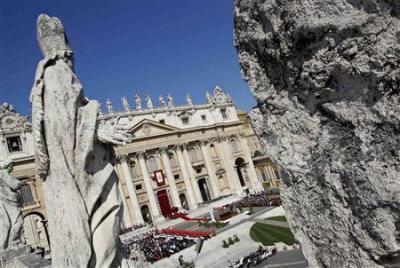Could the Catholic Church change its structure?

Imagine living in a community of 100 families where the father of one of the families is given oversight and decision-making authority over all of the families. Who in their right mind would ever subject themselves to such a repressive arrangement, right? Thankfully, God created man and woman with free will so that parents can make the decisions for their family, rather than being ruled by someone outside their home.
And since God instituted both the family and the church, consider the implications of having centralized control not only in a hypothetical autocratic community, but also in a hierarchical religious organization. If you are under the impression that a religious hierarchy is untouchable, I wonder who or what ever gave you that idea. While God's Word of course never changes, church structure can and should be adapted to assure that local congregations are free to follow the leading of the Holy Spirit.
When your church structure becomes more of a burden than a blessing, it is time to start thinking outside the box. When control and cover-ups begin to poison a church's polity and threaten the safety of children, it should be a wake-up call to Christians to embrace the simplicity of the New Testament church. In the early church, solid substance led to healthy structure. "They devoted themselves to the apostles' teaching and to the fellowship, to the breaking of bread and to prayer." (Acts 2:42) It was not about power and control over congregations, but about the love of Christ and unity in the Gospel.
Today there are plenty of Christian congregations that choose to operate under the authority of religious officials outside their congregation. The largest hierarchical religious organization in this regard is the Catholic church. It has been structured so as to rule and legislate from the top down. The following hierarchy is firmly entrenched within this religious organization:
Pope
Cardinals
Archbishops
Bishops
Priests
Deacons
The Laity
Catholics have been conditioned to accept this institutional hierarchy as if it's the only way to carry out ministry. But what if a significant number of the estimated 1.2 billion Catholics in the world decided to rethink this paralyzing paradigm? What if they chose to reduce the amount of power currently given to a relatively small number of church officials around the world, and instead structured themselves in a way that equipped and empowered local leaders within each congregation? In other words, "Could the Catholic church change its structure?"
The answer, of course, is "Yes." Every parish could be encouraged to prayerfully form a governing body made up of 6 or 7 gifted leaders selected from within the congregation. This governing body could consist of Christians who are known to be wise and mature believers, including of course the parish pastor.
Compare this idea to the way things are currently set up according to canon law, which is a code of ecclesiastical laws governing the Catholic church. In Minnesota for example, "Church law in the Diocese of Duluth requires that each parish have a five-member corporate board of directors. The bishop is the president of the board, the parish pastor is the vice president and the vicar general is a member of the board. The remaining two members, lay trustees, are parishioners who represent the broad interests of the entire parish community."
And here is how the Roman Catholic Diocese of Syracuse, New York, explains their role in overseeing congregational decisions: "No act or proceeding of the Trustees of any such incorporated church shall be valid without the sanction of the archbishop or bishop of the diocese to which the church belongs..." This approach assures that everything is ultimately controlled by the hierarchy of church officials. And since every diocesan bishop essentially functions as the president of every parish under his rule, the Catholic organization operates very much like a community of 100 families where one father in town gets to be the ultimate shot caller for every family. And in the Roman Catholic system, there are additional shot callers over every parish as you move up the chain of command.
Imagine how you would feel as a parent living in a town where one father had authority over 100 families. Every family in town would be left with three options: (1) Submit to the authority and decisions of one father in your community; (2) Work with the other 99 families in your town to change the authority structure; or (3) Move to a town where every family is free to make their own decisions.
Men don't develop into responsible fathers if you take away their God-given responsibility to feed and lead their own children. And Christians with leadership gifts end up sitting on the sideline whenever institutional officials insist on retaining the spiritual authority that rightfully belongs to congregational leaders on the local level. As it stands right now under canon law, "A parish is a definite community of Christian faithful established on a stable basis within a particular church; the pastoral care of the parish is entrusted to a pastor as its own shepherd under the authority of the diocesan bishop." That is to say, under the authority of one father who makes many decisions for the church families (congregations) under his spiritual rule.
Since this approach is fraught with serious control issues, imagine what would happen if every parish began to oversee their congregational ministry. Envision Catholic congregations as well as church officials choosing to exercise their free will. The officials could choose to begin trusting local leaders to make wise decisions as they use the gifts of leadership and discernment the Holy Spirit has given them. And the congregational leaders could be encouraged to make whatever decisions are deemed best for their own church family.
Think of all the potential benefits if the bishops, cardinals and pope were to humbly set aside their current titles and roles in order to become an advisory council for Catholic congregations. The local leaders would suddenly hold the decision-making authority for their respective parish. And the personal growth of leaders within every Catholic congregation would skyrocket. Church officials would no longer be a bottleneck or a source of ongoing controversy, and the spiritual authority would shift to those who serve on the front line at the local level.
After all, are the out-of-town officials any wiser than the spiritually mature believers within each parish? And are they more qualified to handle human resource issues than those Christian leaders who serve in Catholic congregations all over the world? Why should the leadership gifts God has given to Christians in every parish be placed on the back burner so that a select few can maintain their current level of institutional control, organizational power, and decision-making authority?
Imagine transforming the Vatican from the corporate headquarters of the Catholic church into an educational and historical museum for Catholicism. And the institutional officials could be transitioned into an advisory role where these men no longer rule over 1.2 billion Catholics. If truth be told, it is not wrong or unbiblical to have congregations governed by local spiritual leaders rather than out-of-town officials. If you are willing to think outside the box, you will see that it just makes sense on so many levels.
Millions of Catholics work hard every day to serve the poor and assist the needy, while proclaiming the love of Christ in a broken world. And so why not trust them to prayerfully call the shots as they rely upon the collective wisdom of their congregational leaders? That's not to say the people should stop seeking counsel from various Catholic advisors, but it is to say that it might be time for Catholics to rethink how their church is structured. We might all be shocked to learn how many Catholics would love to repeal and replace the secrecy, politics and control that bleeds from their hierarchical structure.
Consider the essence of Christianity and the essence of the church. At the end of the day, Christians can base their fellowship with other congregations on their common commitment to being ruled by a hierarchy of officials in their religious organization; or they can base their fellowship on the Gospel and on Scripture as local leaders make godly decisions that are in the best interest of those they serve. Jesus said, "Whoever wants to become great among you must be your servant." (Matt. 20:26) The most reliable and humble leaders are servant leaders. And there are servant leaders in every Catholic parish who would do a fantastic job of overseeing the ministry within their own congregation, if only given the opportunity.
Man, by nature, longs to have control over others. And when Christian congregations become "turf" for officials whose first concern is the international organization, it can lead to calculated political maneuvering and regular cover-ups. And who tends to suffer the most? Young children and pre-teens. Whenever abusive behavior takes place within a powerful international organization, there is bound to be an organized effort to hide the facts. It is simply the nature of the beast. After all, the reputation of the international organization is at stake.
When did our Lord ever say the church should structure itself with an institutional hierarchy? The New Testament simply espouses a plurality of spiritual leaders within each congregation. Children have parents and church families have leaders. Would you say your congregation feels more like a family or more like a corporation? Sadly, some religious officials engage in the kind of secret dealings we have come to expect from the government and the corporate world. This is not at all what our Lord intended when telling the apostles, "All authority in heaven and on earth has been given to me. Therefore go and make disciples of all nations." (Matt. 28:18,19) Jesus has all authority because "Christ is the head of the body, the church." (Col. 1:18)
With all of these pertinent factors in mind, could the Catholic church change its structure? Sure. Will they? You would have to ask Catholics that question. And if you do, be sure to mention that the question of church structure ultimately resides with those who are already serving on the front line of congregational ministry.
The church our Lord instituted was never intended to be an institutional hierarchy, but rather, a warm and loving family. Christ's body of believers around the world serve within congregations, and like parents, spiritual leaders within a congregation must reside within that family. You cannot provide proper care, instruction, and decision-making from an out-of-town office. You must be on site full-time if you are going to fulfill your God-given calling as a parent in the home, or a Christian leader in the congregation. For example, fathers who travel a lot know how difficult it is for a dad to raise his children if he is always away from home. (See "5 Tips for Raising Children Who Love Jesus.")
Change is rarely easy. In fact, devout Catholics who are interested in changing their church structure will likely experience some fearful religious sentiments, such as: "It feels like we would be going against our church if our congregational leaders exercised this much spiritual authority in our parish." And, "It feels like we would not be submitting to our bishop and to the pope if we transitioned them into an advisory role." Just realize that you feel this way because you have been conditioned to feel this way. The critical question for Christians in the Catholic church is simply, "Would we be going against Christ and against Scripture to structure our congregation this way?"
It has wisely been said: "In essentials, unity; In non-essentials, liberty. In all things, charity." When congregations apply this principle to their structure, the spiritual gift of leadership (Rom. 12:8) that the Holy Spirit gives to certain believers in every congregation is utilized in a much greater way. And the benefits are immense.
Sadly, those who cannot or will not break through their ingrained assumptions and religious feelings end up stuck at the point of maintaining the status quo. They refuse to allow themselves to even consider the question of change. Their minds are closed on the issue, and their closed minds result in blind allegiance to the organization, even after widespread child abuse has been systematically covered up. (See the recent New York Times article, "Catholic Priests Abused 1,000 Children in Pennsylvania, Report Says.")
On the other end of the spectrum, loving care and wise decisions from qualified leaders on the local level is a beautiful thing to behold. And it beats corporate secrecy and institutional cover-ups every day of the week and twice on Sunday. If the current structure of your religious organization is not utilizing the leadership gifts of God's people or providing adequate protection for children, just remember that it is not a sin to change the structure.
And I would offer an additional suggestion to anyone wanting to promote unity in your church. The congregation I have served as pastor since it was planted nearly 12 years ago has a 6-member Executive Board that includes the pastor. In addition, we have held a Monday night congregational meeting every month since the church began. It allows people to offer ideas and become involved in the broader planning and decision-making process, and it helps to prevent politics from developing. It presents a regular forum for open, honest and gracious dialogue where anyone in the congregation can ask questions, offer input, and participate in the decision-making process. There is no question that a flat structure can help foster unity in a church family.
Just as parents are privileged to lead their family, Christians deserve the privilege to lead their congregational ministry. Imagine that hypothetical community of 100 families coming out from under the thumb of one father in their town. Just think how such a move would empower loving parents to make wise decisions for their own family. And just imagine how structural revision in the Catholic church could pave the way for a spiritual revival among Catholics.
Such a revival would certainly require the power of the Holy Spirit and the truth of the Gospel. The good news of salvation through Christ alone is the only message that can deliver a person from sin and death, and the only message that can breathe new life into a Christian congregation. Here are a couple articles I have written that express the life-giving power of the Gospel:
"Galatians for Catholics, Protestants and Every Christian."
"Can Catholics Have the Assurance of Salvation?"
The answer is "Yes, Catholics can certainly come to have this blessed assurance." As the apostle Peter declared on the day of Pentecost: "Everyone who calls on the name of the Lord will be saved." (Acts 2:21) And the Christian church was instituted by our Lord to be a loving family where God's children grow in their faith and in service to others. If your church structure has become a hindrance rather than a help, feel free to do something about it.
The Lord will reward your efforts and your courage for the cause of Christ as you work to protect the most vulnerable who are under your spiritual care and protection, and as you "wake up the sleeping giant" consisting of 1.2 billion Catholics. The gift of leadership already resides within many Catholics. Now it's just a matter of structuring your church so that these spiritual gifts do not remain buried in the ground.


























